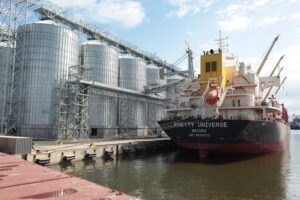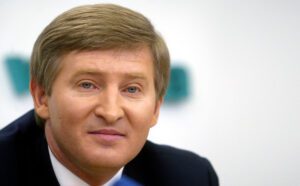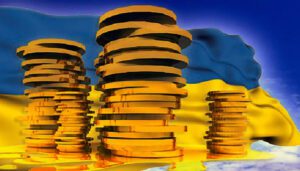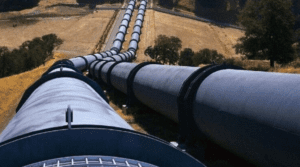
Problems with logistics and electricity in the export of agricultural products from Ukraine during the war make it unprofitable to grow crops, so in 2023, the total yield in the country will reduce three times compared to the record prewar level – to 40 million tons from almost 120 million tons.
Reducing the harvest to such low levels is already inevitable due to the current economic situation in the country, but by financing the agricultural sector, Ukraine can achieve by 2024 to increase the harvest up to 70 million tons, said the owner of the grain trading holding Prometheus Rafael Goroyan in an interview with Interfax-Ukraine agency.
“Last year we harvested 120 million tons of grain and oilseeds, this year we have already fallen to 60 million tons, and next year, according to my forecast, there will be 40 million tons, that is a fall of 300%! At the same time, the entire infrastructure of Ukraine is sharpened under the harvest of 120 million tons or even more, is what we have achieved for 30 years of independence. The entire infrastructure is designed for 120 million tons – cars, wagons, stations, ports, elevators – and there will be no goods!”, – stressed the head of Prometheus in an interview.
“There will be a very sharp shortage of wheat, barley and corn. Sunflower and soybeans will be enough, these are high-margin crops, and corn will not be sown. Now it is expensive to dry it, this year’s crop cannot be harvested, cannot be exported – and then, when we win the war (and I think this will happen very soon), the ports will open, the light will appear, and we will have a shortage of products,” he added.
According to Goroyan, a reduction in the grain harvest will lead to a collapse in the value of infrastructure assets in Ukraine, such as ports, elevators and vehicles, as well as a sharp increase in world prices of wheat, corn and barley. In this sense, the reduction of the wheat harvest is especially serious because it is a “politicized” crop, linked to global food security, the shortage of which will lead to an increase in its quotations on major world exchanges.
Thus the government has to urgently begin issuing state-guaranteed loans to agrarians in order to prevent stagnation in gross harvest for several years after 2023. This will allow Ukraine, by investing relatively small funds, to avoid a reduction in the harvest and the associated decline of the farming and grain trading industries, as well as the bankruptcy of logistics and infrastructure companies.
“We need to do this so we don’t see a sharp drop in exports in two years, and we’re likely to see one. Then there will be no agribusiness in the country, the country will be without currency, we will face serious unemployment, big inflation and all things will go wrong. I believe that we need urgent subsidies from the state to the agricultural producer, very urgently, literally for yesterday. And this should be done in light, without complicated formalities, because the average and small Ukrainian farmer does not like to formalize anything”, – said Goroyan during the conversation.
As it was reported, Ukrainian agrarians harvested 71.72 million tons of major crops from the total area of 17.05 million hectares by December 23. This figure is given including sugar beet, which was harvested 9 million tons from 179 thousand hectares.
The final yield of wheat in this season amounted to 19.4 million tons from 4.7 million hectares, barley – 5.6 million tons from 1.6 million hectares, rape – 3.2 million tons from 1.1 million hectares, pea – 261 tons from 115 thousand ha. In addition, on December 23, a total of 20.2 million tons of corn from 3.1 million hectares (+0.2 million ha), 10.1 million tons of sunflower from 4.6 million ha, 3.7 million tons of soybeans from 1.5 million ha, 157 tons of buckwheat from 115 thousand ha and about 100 tons of millet from 43.5 thousand ha were collected.
Ukraine in 2021 collected a record harvest of cereals, legumes and oilseeds at 106 million tons: 84 million tons of cereals and legumes and 22.6 million tons of oilseeds.
A total of 32.4 million tons of wheat, 40 million tons of corn, 10 million tons of barley, 581.5 thousand tons of peas, 191 thousand tons of millet and 110 tons of buckwheat were harvested last year. Sunflower harvest amounted to 16.3 million tons, soybeans – 3.4 million tons and rapeseed – 2.9 million tons.

Rinat Akhmetov, with a capital of $4.4bn, has topped the rating of Ukraine’s richest businessmen, the Forbes Ukraine website has reported.
According to the ranking, Akhmetov’s fortune dropped from $13.7bn to $4.4bn in 2022. His largest assets are the Metinvest company and the DTEK group. Akhmetov’s agricultural, energy and metallurgical businesses suffered from the war, in particular Azovstal and Ilyich Iron and Steel Works in Mariupol were lost.
The second and third place went to co-founders of the IT company Grammarly, Maxim Litvin and Oleksiy Shevchenko. The state of each decreased from $4 to $2,3 billion during the war.
Next in the ranking is Victor Pinchuk, whose fortune has decreased from $2.6 billion to $2.2 billion. His fortune is provided by his company Interpipe, real estate and cash, according to Forbes.
Konstantin Zhevago is at the bottom of the five richest people. His fortune dropped from $2.1 billion to $1.4 billion. His largest asset is the company Ferrexpo.
Also in the ranking are co-founders of the Epicenter K Group Alexander and Galina Geregi ($1.2bn), co-owner of fintech startup Revolut Vlad Yatsenko ($1.1bn), owner of Smart Holding Vadim Novinsky ($1bn), Hennadiy Boholyubov ($1bn) and Sergiy Tihipko ($870m).
The publication specifies that Ihor Kolomoyskyy, who was fourth in the ranking of the richest businessmen last year, was not included in the list in 2022 due to his loss of Ukrainian citizenship.

Ukraine’s aggregate public debt in November 2022 rose by 4.2%: in dollar terms – by $4.34 billion, to $107.46 billion, in UAH – by UAH 158.7 billion, to UAH 3.930 trillion, according to the Ministry of Finance website.
According to them, direct government debt last month increased by 4.5% to $97.69 billion, or 3.572 trillion UAH, mainly due to a loan from the European Union ($2.95 billion) and placement of government bonds ($0.56 billion, or 20.44 billion UAH).
External direct debt, in particular, rose by 6.4% or $3.68 billion to $61.48 billion, while the domestic direct debt increased by 1.6% or 20.44 billion UAH to 1.324 trillion UAH (the equivalent of $36.21 billion).
According to the Ministry of Finance, the state-guaranteed debt in November increased by 1.1% in dollar terms, or $0.1 billion – to $9.77 billion, while in UAH – by 3.83 billion UAH, to 357.4 billion UAH.
The main share of state-guaranteed debt falls on the foreign debt, which rose in November by 1.6% or $0.12 billion to $7.83 billion.
Since the beginning of 2022, Ukraine’s aggregate national debt in dollar terms increased by 9.7%, or $ 9.51 billion, while in UAH it jumped by 47.1%, or 1.258 trillion UAH.
The total external public debt of Ukraine for 11 months of this year increased by 21.2%, or $12.1 billion – to $69.3 billion, while the total internal debt – by 25.5%, or UAH 283.7 billion – to UAH 1.395 trillion.
According to the Ministry of Finance, the share of obligations in dollars at the end of November was 31.22%, in euros – 21.03%, in SDR – 13.62%, in Canadian dollars – 1.00%, in yen – 0.90%, British pounds – 0.02%, while in hryvnia – 32.21%.
The Ministry also clarified that 67.14% of the national debt has a fixed interest rate, while 13.62% is linked to the IMF rate, 6.69% – to SOFR, 4.31% – to Libor, 0.43% – to EURIBOR.
Another 3.69% of the government debt is tied to the consumer price index, while 3.74% is tied to the NBU discount rate. We are talking about government bonds from the portfolio of the National Bank, the most recent are papers with a link to the discount rate, which the NBU buys within the framework of the emission financing of the budget.
Finally, 0.38% of the government debt has a rate linked to the Ukrainian index of interest rates on deposits of individuals, used in portfolio guarantee programs.

The tariff on the transit of oil through the territory of Ukraine to Hungary and Slovakia will increase by 18.3% from 1 January 2023 – from EUR11.5 to EUR13.6 per ton, a source in the government told the news agency Interfax-Ukraine.
The information is also confirmed by the Russian media with reference to the data on the website of the Russian Transneft.
In November, Bloomberg reported citing a letter from Ukrtransnafta to Transneft that the Ukrainian side notified the Russian side of the need to increase the tariff by 18% due to the ongoing destruction of the Ukrainian energy infrastructure, which led to a significant shortage of electricity, increasing its cost, a shortage of fuel and spare parts.
In addition, the costs of organizing safe working conditions for personnel and security of the Ukrainian oil transport operator’s facilities have increased.
As earlier reported, the tariff for transit of oil through the Ukraine for Transneft was increased from January 1, 2022 from EUR8.6/ton to EUR9/ton, from April 1, 2022 to EUR11.5/ton.
“Ukrtransnafta in 2021 reduced the transit of oil through the territory of Ukraine by pipeline transport to European countries and Belarus by 3.2% (427.2 thousand tons) compared with 2020 – to 12 million 724.8 thousand tons. In particular, the transit towards Budkovce (Slovakia) amounted to 8 million 594.3 thousand tons (+1.6% compared to 2020), 3 million 411.5 thousand tons (-10.6%) – Feneshlitke (Hungary), 719 thousand tons (-18.2%) – Mozyr (Belarus).
December 5, 2022 the EU and Great Britain imposed an embargo on the purchase of Russian oil, as well as participation of their companies in the transportation of Russian oil by sea and the provision of relevant services. Hungary, the Czech Republic and Slovakia managed to obtain an exception to the embargo on Russian oil from the EU.

Ukrzaliznytsia announces the appointment of seven additional passenger trains on New Year’s Eve, six of which are in the Carpathian direction.
Train number 191/192 Kiev-Lviv on December 30. At 7:44 departure from Kiev, at 15:28 arrival in Lviv. Return trip on the same day: at 8:06 departure from Lviv, at 15:38 arrival in Kyiv.
Train #229/230 Kiev-Uzhgorod via Vinnitsa, Khmelnitsky, Ternopol, Lviv, Slavske, Mukachevo. December 29 at 20:03 departure from Kiev, December 30 at 13:23 arrival in Uzhgorod. Return trip: December 30 at 22:21 departure from Uzhgorod, December 31 at 13:40 arrival in Kiev.
Train #238/237 Odessa-Uzhgorod via Zhmerinka, Khmelnitsky, Ternopol, Lviv, Slavske, Mukachevo. December 29 at 17:00 departure from Odessa, December 30 at 12:02 arrival in Uzhgorod. Return trip: December 30 at 17:00 departure from Uzhgorod, December 31 at 11:06 arrival in Odessa.
Train № 216/215 Zaporizhzhya – Ivano-Frankivsk. December 28 and 30 at 13:05 departure from Zaporozhye, at 4:58-5:50 travel through Lviv and at 8:13 arrival in Ivano-Frankivsk. Return flights: December 29 and 31 at 15:42 departure from Ivano-Frankivsk, at 18:35-19:10 travel through Lviv and at 12:05 arrival to Zaporizhzhia.
№255/256 Kyiv-Chernivtsi via Ivano-Frankivsk and Kolomyia. Departure from Kiev on December 28, 29 and 30, arrival the next day at 5:50 in Chernivtsi. Return flights: December 29, 30 and January 1 at 17:38 departure from Chernivtsi, next day at 9:22 arrival to Kyiv.
№ 211/212 Kharkiv-Lviv. December 29 at 13:43 departure from Kharkiv, December 30 at 8:27 arrival in Lviv. Return trip: at 17:50 from Lviv arriving in Kharkiv at 12:13.
#176/175 Kyiv-Kryvyi Rih via Myronivka, Shevchenko station, Alexandria on December 30. At 6:19 departure from Kiev, at 15:07 arrival in Krivoy Rog. Return trip on the same day: at 8:09 departure

Ports of “Big Odessa” last Saturday and Sunday dispatched 390 thousand tons of agricultural products within the framework of the “Grain Initiative”, the Ministry of Infrastructure of Ukraine reported.
“For the last two days, nine ships left the ports of “Big Odessa” to deliver 390 thousand tons of agricultural products to Africa, Asia and Europe, including bulk carriers ALANDA STAR and SSI PRIVILEGE with 68 thousand tons of wheat for Egypt and Indonesia, as well as tanker EUROCHAMPION with 45 thousand tons of vegetable oil for India,” the Ministry noted.
The Ministry notes that 24 ships are being processed at the ports, involved in the “grain initiative. They load more than 860 thousand tons of Ukrainian agricultural products.
“Grain corridor” also moves three vessels for the loading of 93 thousand tons of agricultural products.
At the same time, 99 ships are waiting for inspection in the Bosporus, 72 of which – to enter the ports for loading, 27 – already with Ukrainian agricultural products.
“Russia’s goal is to slow down the process of vessel inspections. First they reduced the number of inspection teams to three, now they started to drag out the time of inspections themselves. Representatives of the Russian Federation have started to check even indicators that are not stipulated in the documents of the SKC and have nothing to do with the subject of the inspection (for example, whether judicial units work well, how much fuel, etc.),” explains Deputy Minister of Community, Territory and Infrastructure Development Yuriy Vaskov.
According to him, under this algorithm, the inspection of a single ship takes four hours, which leads to a longer queue and at the same time a million losses for the cargo owners because of downtime.
According to the Ministry of Infrastructure, as of December 25, inspection group #3 had not held a single inspection, resulting in only six inspections per day out of 10 scheduled.
The agency noted that for continuous movement of grain corridor should be held at least 12 inspections per day.
In total, since August 1, 594 ships left the ports of Greater Odessa, which exported 15.5 million tons of Ukrainian food to Asia, Europe and Africa.